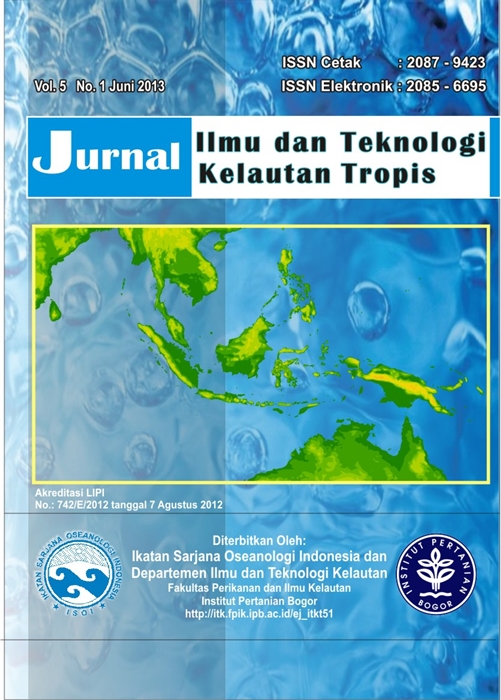THE EFFECTS OF DIFFERENT IMMERSION METHOD AND TIME ON THE PHYSICO-CHEMICAL CHARACTERISTICS OF SKIPJACK TUNA (Katsuwonus pelamis) FISH MEAL
Abstract
High fat content in a dark fleshed fish can affect on nutritional value because it can lead to odors in fish meal products. Effort Immersion (deffating) is one way to reduce fat content in fish meal products in order to reduce the products from odor. Research on methods and durations of immersion effects were conducted from October to November 2011. This study aimed to determine the best method to get quality materials skipjact tuna fish meal based on methods and durations of immersion. Fish sampling were taken from the village of Latuhalat, Ambon-Maluku waters. Deffating process used water, 3% acetic acid, and 0.8% sodium bicarbonate. Immersion durations were 2, 4, and 6 hours. Deffating method using 0.8% sodium bicarbonate with 6 hours immersion time exhibited the best quality fish meal with protein content of 82.86% and 1.10% fat content.
Keywords: deffating, fish meal, skipjact tuna.
Authors
This work is licensed under a Creative Commons Attribution 4.0 International License.
Jurnal Ilmu dan Teknologi Kelautan Tropis i is an open-access journal, meaning that all content is freely available without charge to the user or their institution. Users are allowed to read, download, copy, distribute, print, search, or link to the full texts of the articles in this journal without needing to request prior permission from the publisher or the author.
All articles published by Jurnal Ilmu dan Teknologi Kelautan Tropis are licensed under the Creative Commons Attribution 4.0 International License. This allows for unrestricted use, distribution, and reproduction in any medium, provided proper credit is given to the original authors.
Authors submitting manuscripts should understand and agree that the copyright of published manuscripts is retained by the authors. Copyright encompasses the exclusive rights of authors to reproduce, distribute, and sell any part of the journal articles in all forms and media. Reproduction of any part of this journal, its storage in databases, and its transmission by any form or media is allowed without written permission from Jurnal Ilmu dan Teknologi Kelautan Tropis.


